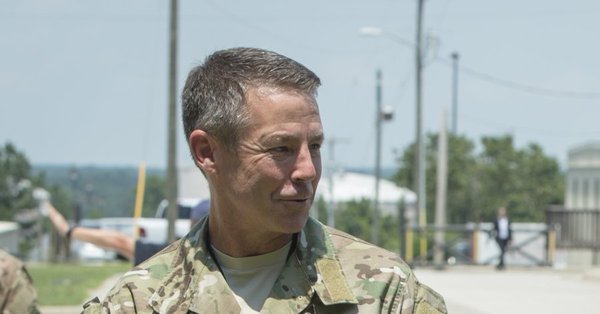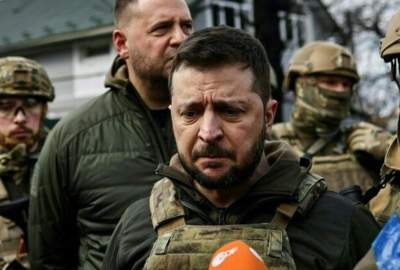Lt. Gen. Scott Miller has been chosen as the next commander of U.S.-led forces in Afghanistan, according to senior military officials, after two years in charge of the military’s secretive Joint Special Operations Command.
Publish dateTuesday 22 May 2018 - 14:39
Story Code : 164067
AVA- Gen. Miller, a decorated special-operations soldier, will be the ninth U.S. general in 17 years to take charge of the war in Afghanistan and the first to be appointed under President Donald Trump. The Pentagon declined to comment until the decision is formally announced.
As JSOC commander, Gen. Miller headed some of America’s most-secretive missions, pursuing suspected terrorists around the world with drones and elite units that included the Army’s Delta Force and the Navy’s SEAL Team Six.
Among those operations, he was a captain in charge of a contingent of Delta Force in the Battle of Mogadishu in 1993, recounted in the book and movie “Black Hawk Down.” He was awarded a Bronze Star for his service there and later served multiple combat deployments to Afghanistan and Iraq.
Among those operations, he was a captain in charge of a contingent of Delta Force in the Battle of Mogadishu in 1993, recounted in the book and movie “Black Hawk Down.” He was awarded a Bronze Star for his service there and later served multiple combat deployments to Afghanistan and Iraq.
If all goes as expected, Gen. Miller will take over the Afghan war at a time when a fragmented, Taliban-led insurgency remains in control of swaths of the countryside and is renewing a push into major cities, despite the arrival of thousands of additional U.S. forces.
Last week, the Taliban overran the capital of Farah province, taking over key government buildings before being driven out by U.S. fighter jets in support of local forces. It was the first near-loss of an Afghan provincial capital since the Taliban overran the city of Kunduz in 2016.
Mr. Trump decided last year to send about 4,000 additional troops, bringing the number of American personnel to approximately 14,000. The emphasis on Afghanistan is part of a broader shift that ultimately is expected to shrink America’s military footprint in the Middle East as it refocuses its capabilities in East Asia.
Gen. Miller has served in Somalia, Afghanistan and Iraq, and now will head a mission that is now heavily dependent on American special-operations forces that are backing local Afghan army and police units. The Afghan government took over the war against the Taliban in 2014, but it continues to rely on the U.S. for most of its funding and extensive military support.
Gen. Miller is known for aggressively stepping up operations in Iraq while at the helm of Delta Force, a senior military official said. He faces a complex job in Afghanistan, where the war has grown more complicated in recent years, as Washington accused rival countries such as Russia and Iran of backing the insurgency, charges that both Moscow and Tehran deny.
Even with the deployment of additional forces, the war in Afghanistan is showing few signs of progress, according to a new report by the multiagency Lead Inspector General-Overseas Contingency Operations this week. It said the declining Afghan security-force numbers are renewing concerns about high casualties and staffing rates, and the overall effectiveness of the army and police.
The United Nations Assistance Mission in Afghanistan said last month that civilian casualties remained near a record at more than 2,250 in the first quarter of 2018, and that suicide bombings and complex attacks by insurgents were twice as deadly as in the previous year.
Despite the sustained violence, the departing commander of U.S.-led forces, Gen. John Nicholson, told reporters earlier this year that prospects for reconciliation are improving. The U.S. military bulked up its presence in Afghanistan at the start of 2018, reallocating drones and other hardware and sending in around 1,000 new combat advisers.
Last week, the Taliban overran the capital of Farah province, taking over key government buildings before being driven out by U.S. fighter jets in support of local forces. It was the first near-loss of an Afghan provincial capital since the Taliban overran the city of Kunduz in 2016.
Mr. Trump decided last year to send about 4,000 additional troops, bringing the number of American personnel to approximately 14,000. The emphasis on Afghanistan is part of a broader shift that ultimately is expected to shrink America’s military footprint in the Middle East as it refocuses its capabilities in East Asia.
Gen. Miller has served in Somalia, Afghanistan and Iraq, and now will head a mission that is now heavily dependent on American special-operations forces that are backing local Afghan army and police units. The Afghan government took over the war against the Taliban in 2014, but it continues to rely on the U.S. for most of its funding and extensive military support.
Gen. Miller is known for aggressively stepping up operations in Iraq while at the helm of Delta Force, a senior military official said. He faces a complex job in Afghanistan, where the war has grown more complicated in recent years, as Washington accused rival countries such as Russia and Iran of backing the insurgency, charges that both Moscow and Tehran deny.
Even with the deployment of additional forces, the war in Afghanistan is showing few signs of progress, according to a new report by the multiagency Lead Inspector General-Overseas Contingency Operations this week. It said the declining Afghan security-force numbers are renewing concerns about high casualties and staffing rates, and the overall effectiveness of the army and police.
The United Nations Assistance Mission in Afghanistan said last month that civilian casualties remained near a record at more than 2,250 in the first quarter of 2018, and that suicide bombings and complex attacks by insurgents were twice as deadly as in the previous year.
Despite the sustained violence, the departing commander of U.S.-led forces, Gen. John Nicholson, told reporters earlier this year that prospects for reconciliation are improving. The U.S. military bulked up its presence in Afghanistan at the start of 2018, reallocating drones and other hardware and sending in around 1,000 new combat advisers.
Gen. Nicholson began his tour in charge of the Afghan war in March 2016.
source: WSJ
Gen. Nicholson began his tour in charge of the Afghan war in March 2016
Source : Afghan Voice Agency(AVA)
avapress.com/vdcd9o0f5yt09z6.em2y.html
Top hits













